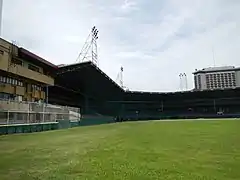 | |
| Location | P. Ocampo St. corner Adriatico St., Malate, Manila, Philippines |
|---|---|
| Public transit | |
| Owner | City Government of Manila |
| Operator | Philippine Sports Commission |
| Capacity | 10,000 Expanded/Renovated |
| Field size |
|
| Construction | |
| Opened | 1934 |
| Renovated | 1946,[2] 1953,[3] 1981,[3] 1991,[3] 2005[3] |
| Architect | Juan Arellano |
| Tenants | |
| Philippines national baseball team Baseball Philippines (2007–2012) UAAP Collegiate Baseball Philippine Baseball League (2019–present) | |
The Rizal Memorial Baseball Stadium is a baseball stadium located inside the Rizal Memorial Sports Complex in Manila, Philippines. It has a seating capacity of 10,000.
History
1934 Far Eastern Championship Games

The Far Eastern Championship Games (also known as Far East Games) was a small Asian multi-sport competition considered to be a precursor to the Asian Games. In 1912, E.S. Brown, president of the Philippine Athletic Association and Manila Carnival Games, proposed the creation of the "Far Eastern Olympic Games" to China and Japan. It was at that time that Governor-General William Cameron Forbes was the president of the Philippine Amateur Athletic Association from 1911-1913. Governor-General Forbes formed the Far Eastern Olympic Association. [4]

The first Far Eastern Championship Games was held in the Manila Carnival Grounds in Malate, Manila, Philippines on February 4, 1913. Forbes was also the one who formally declared the games open. Six countries participated in the eight-day event: The Philippine Islands, Republic of China, Empire of Japan, British East Indies (Malaysia), Kingdom of Thailand and British crown colony Hong Kong. The Philippines also hosted the games in 1925 and 1934.
The Manila Carnival Grounds was redeveloped into the Rizal Memorial Sports Complex in 1934, named in honor of the country's national hero, Dr. Jose Rizal, before the 10th Far Eastern Games. Baseball was a main event in every Far Eastern Games and in that year, the games were played at the new Rizal Memorial Baseball Stadium. Legendary American players Lou Gehrig and Babe Ruth hit the first and second home runs, respectively. The game that saw the participation of an all-star team, which included Gehrig, Ruth and Jimmy Foxx, was one of the highlights of the stadium’s history.[1]
World War II

In February 1945, the Japanese forces built a defensive stronghold in their retreat against the advancing American infantry. The stronghold was built in the Harrison area, which included De La Salle University and the Rizal Memorial Baseball Stadium. The 1st Cavalry Division of the Americans defeated the Japanese by utilizing three tanks, demolitions, and flamethrowers.[5] The Rizal Memorial Baseball Stadium suffered devastation due to the war.
By April 1945, Garrisoned American & Filipino soldiers under the United States Army, Philippine Commonwealth Army & Philippine Constabulary were playing baseball before thousands of spectators at the ruins of the stadium after the liberation.[6] The stadium was repaired with the floodlights of the then newly renovated stadium first opened by January 1946.[2]
1954 Asian Baseball Championship
The stadium was the venue of the 1954 Asian Baseball Championship. The year 1954 is considered as the beginning of the golden era in Philippine baseball history as the Philippines won first place in the Asian Baseball Championships. The Philippines was the inaugural champions of the Asian Baseball Championships in 1954 but finished fourth in seven of the next eight editions of the biennial events. [7]
Architecture
The Rizal Memorial Stadium is considered to be an Art Deco architectural design that incorporated streamlines and simpler lines, flat surfaces and rounded edges. The design represented stability and modernity.[8] The complex, built under the supervision of architect Juan Arellano, started construction in 1927.[9]
.jpg.webp) The stadium's facade featuring Art Deco lettering
The stadium's facade featuring Art Deco lettering Stadium's bullpen
Stadium's bullpen Grandstand of the stadium
Grandstand of the stadium
See also
References
- 1 2 "About the Philippines". NSWJBL Touring Team Programme. NSW Junior Baseball League. Archived from the original on 20 May 2013. Retrieved 3 May 2014.
- 1 2 "Night Baseball in the Philippines". Ellensburg Daily Record. 26 December 1945. Retrieved 22 January 2016.
- 1 2 3 4 Sampayan, Jac (12 September 2019). "Will it beat the SEAG deadline? Inside the Rizal Memorial makeover". ABS-CBN News. Retrieved 20 September 2019.
- ↑ "Far Eastern Championship Games". Olympic Council of Asia. Retrieved 3 May 2014.
- ↑ Dr. Thomas M. Huber. "The Battle of Manila". The Battle of Manila Scrapbook. Retrieved 3 May 2014.
- ↑ "Baseball Returns to the Philippines". Times Daily. Associated Press. 16 April 1945. Retrieved 22 January 2016.
- ↑ Gabriel Fidler. "Philippines Preparing for Baseball Renaissance". Baseball Stitch Ring. Retrieved 3 May 2014.
- ↑ "National Commission for Culture and the Arts". NCCA. Archived from the original on 3 May 2014. Retrieved 3 May 2014.
- ↑ Manila Bulletin. "Rizal Memorial Declared Historical Landmark". Yahoo News Philippines. Retrieved 4 May 2014.